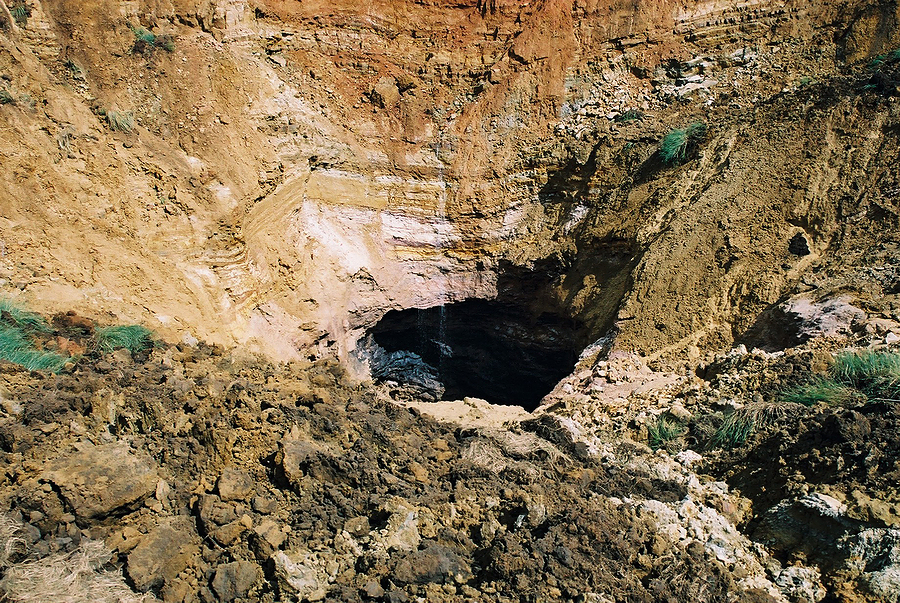Florida homeowners came by the hundreds in cars and buses to speak out against the state-backed property insurer’s plan to increase sinkhole rates by an average 429 percent.
At an unprecedented public hearing in Tampa last night, Citizens Property Insurance Corp. officials received an earful of criticism, including from with Insurance Commissioner Kevin McCarty who has until Monday to make a final decision on the filing.
McCarty once again expressed his position that the proposed rate increase that could increase rates for some homeowners by more than 2,000 percent is not supported by any actuarial figures. ‘Without concrete data, you are asking residents in some counties to pay $5,000 more,’ he said.
McCarty, along with other officials, are banking hard that the sinkhole reforms contained in SB 408, an omnibus property insurance bill enacted by lawmakers this year, can contain a sinkhole crisis. Among other things, the new law created a statutory definition of ‘structural damage,’ placed a two-year limit on claims, and created a number of fraud provisions.
At an emergency board meeting held yesterday, Citizens agreed to phase-in any sinkhole coverage rate increase over a number of years and limit any increase for next year at 50 percent so that the impact of SB 408 can be assessed.
At that meeting, Carlos Lacasa, Citizens chairman, said the decisions were made to specifically allay the concerns of state officials and homeowners. He said “stair-stepping’ the increases would get Citizens some needed revenue while allowing time for a new property law to ‘moderate future rate needs.’
But for the many homeowners who came to the hearing all the talk over actuarial numbers, phase-in plans, and statutory jargon was overshadowed by the sheer distress of potentially having to pay hundreds and thousands of dollars more in premiums.
State Senator Mike Fasano (R-New Port Richey) who organized a three-bus caravan of homeowners, reminded regulators that the proposed rate changes were no abstract debate. And that the issue directly affected human lives. Pointing to the crowd, he said, ‘They are the face of this very real crisis.’
Citizens officials could do little more than reiterated same arguments the insurer has offered since the rate hike was first proposed. They reminded officials that the state law, SB 408, requires Citizens to charge actuarially sound rates for sinkhole coverage.
Citizens Chief Financial Officer Sharon Binnun said that any savings from SB 408 will take time as evidenced by the fact that the insurer has received 1,400 new sinkhole claims during the first six months of this year, which is roughly twice the number filed in the same period last year.
In 2010, the insurer only collected $32 million in sinkhole premiums against $250 million in claims. Some in the industry believe sinkhole claims could actually be higher this year as people rushed in to file claims before all the new laws took effect.
‘It doesn’t take a technical analysis to conclude those numbers pose a financial strain for the company,’ said Binnun.
State Rep. Jimmy Smith (R-Inverness), who voted for SB 408 requiring the insurer to shore-up its sinkhole rates, said nevertheless Citizens should have considered other options before proposing thousands of dollars in rate increases.
‘That ought to have been a light bulb moment,’ Smith said.
Other lawmakers said they would seek a repeal of the statutory Citizens sinkhole requirements when the legislature convenes its organizational session come January.
In addition to the increase in sinkhole rates, many more of the 1.4 million homeowners insured through Citizens are also facing higher overall rates. Although by law, the insurer is restricted to raising rates by only 10 percent annually, it can factor in other costs such as surcharges, sinkhole rates and reinsurance costs.
In Citizens personal lines account that provides multi-peril policies to roughly 970,000 homeowners, the insurer is requesting that the rates for the standard HO-3 policies increase by 26.6 percent, with the caveat that the figure includes the proposed sinkhole rate increases minus the phase-in. Rates for renters policies (HO-4) would increase by an average 3.6 percent and those for condominium unit owners (HO-6) by an average of 8.5 percent.
In the coastal account that includes both wind-only and multi-peril policies, homeowners (HO-3) would see an average 12.2 percent increase. Renters (HO-4) would see their rates increased by 10.5 percent and condominium unit owners (HO-6) by 11.1 percent.
Some in the state are worried that the insurance increases could harm an already depressed housing market along the state’s south central coastal area.
Former Hernando County Commissioner Rose Rocco said the proposed increases could lead to more foreclosures by putting further pressure on the already strained finances of seniors and the unemployed.
‘Homes use to be the American dream, now it is the American nightmare,’ Rocco said.
Topics Carriers Legislation Florida Homeowners
Was this article valuable?
Here are more articles you may enjoy.



 Beazley Agrees to Zurich’s Sweetened £8 Billion Takeover Bid
Beazley Agrees to Zurich’s Sweetened £8 Billion Takeover Bid  The $3 Trillion AI Data Center Build-Out Becomes All-Consuming for Debt Markets
The $3 Trillion AI Data Center Build-Out Becomes All-Consuming for Debt Markets  Uber Jury Awards $8.5 Million Damages in Sexual Assault Case
Uber Jury Awards $8.5 Million Damages in Sexual Assault Case  Florida Senate President Says No Major Insurance Changes This Year
Florida Senate President Says No Major Insurance Changes This Year 

